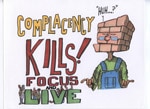

More career-ending injuries and fatalities occur during winter months – even in warmer climates – than any other season of the year.
Even veteran rails – not just new yard employees — lose their situational awareness during this period, and the price they pay is devastating.
Maybe it’s the holidays. Maybe it’s concern over bills that arrive after the holidays. Maybe it’s seasonal darkness. Maybe it’s thoughts of summer’s return. Maybe, maybe, maybe.
But what we know is that when we lose situational awareness, the likelihood of losing limbs or life skyrockets, and the objective of zero switching accidents and fatalities flies out the window faster than heat through an open window into chill air.
Consider the cold, hard facts:
* 23 percent of yard fatalities occur in December and January.
* 50 percent of fatalities from being struck by mainline trains occur in December and January.
* 2011 is stacking up as a more dangerous year than 2010. Just through September 2011, according to the Federal Railroad Administration, 51 severe injuries occurred vs. 47 for the first nine months in 2010. Eight amputations occurred during the first nine months of 2011 vs. same period in 2010.
Here are some tips to help you avoid a career-ending injury or loss of your life this winter season:
* Be sure winter clothing does not restrict movement, or degrade hearing and vision.
* Identify any winter-related conditions affecting safety. For example, ice can cause derailments. Ice, snow and mud can cause falling. And snow can muffle sound and reduce visibility.
* Adjust productivity expectations based on darkness and weather.
* Discuss winter conditions in safety briefings, and post any weather-related concerns on bulletin boards.
* Above all, don’t lose situational awareness no matter other circumstances in your family or personal life.
Finally, as in all months of the year:
* Review current operating and safety rules that specifically address remote control locomotive and conventional switching operations that require employees to go between rolling equipment, and determine whether those rules provide adequate protection to employees, or need to be updated or revised.
* Develop, implement and monitor sound communication protocols that require employees on multi-person switch crews to notify their fellow crewmembers when the need arises to enter between two pieces of rolling equipment – regardless of whether the employee is the primary RCO or working on a conventional crews.
* Review SOFA Safety Recommendation No. 1 relating to adjusting knuckles, adjusting drawbars and installing end-of-train devices, and communicate procedures implementing that recommendation to employees working in yards or other locations where the possibility of entering between rolling equipment exists.
That recommendation provides: Any crew member intending to foul track or equipment must notify the locomotive engineer before such action can take place. The locomotive engineer must then apply locomotive or train brakes, have the reverser centered, and then confirm this action with the individual on the ground.
Additionally, any crew member that intends to adjust knuckles/drawbars, or apply or remove an EOT device, must ensure that the cut of cars to be coupled into is separated by no fewer than 50 feet. Also, the person on the ground must physically inspect the cut of cars not attached to the locomotive to ensure they are completely stopped; and, if necessary, a sufficient number of hand brakes must be applied to ensure the cut of cars will not move.
* Recognize that personal safety is your responsibility.
* Always perform tasks safely and in compliance with established railroad rules and procedures.
To view more information on rail safety, click on the following link:
Related News
- SMART-TD Applauds FRA and DOT for Strengthening Cross-Border Rail Safety Protections
- Regional Training Seminars coming to St. Paul, Baltimore in 2026
- Transit Funding Boost Proposed by SMART-TD Backed Bill
- California SMART-TD Brother Killed on the Job
- Union Mourns the Loss of Brother Charles Harrison
- FRA Issues Grade-Crossing Safety Advisory
- Amtrak To Give SMART-TD Members Holiday Bonuses
- SEPTA Strike Avoided: Strong Agreement Secured
- Posthumous Retirement Ceremony Honors Lost Brother
- SMART-TD: Built by Members, Driven by Your Voice